Related Research Articles

The Balfour Declaration was a public statement issued by the British Government in 1917 during the First World War announcing its support for the establishment of a "national home for the Jewish people" in Palestine, then an Ottoman region with a small minority Jewish population. The declaration was contained in a letter dated 2 November 1917 from the United Kingdom's Foreign Secretary Arthur Balfour to Lord Rothschild, a leader of the British Jewish community, for transmission to the Zionist Federation of Great Britain and Ireland. The text of the declaration was published in the press on 9 November 1917.

Chaim Azriel Weizmann was a Russian-born biochemist, Zionist leader and Israeli statesman who served as president of the Zionist Organization and later as the first president of Israel. He was elected on 16 February 1949, and served until his death in 1952. Weizmann was instrumental in obtaining the Balfour Declaration of 1917 and convincing the United States government to recognize the newly formed State of Israel in 1948.
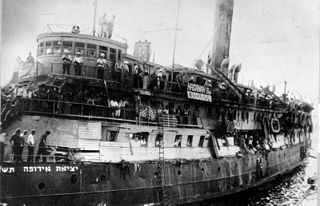
A homeland for the Jewish people is an idea rooted in Jewish history, religion, and culture. The Jewish aspiration to return to Zion, generally associated with divine redemption, has suffused Jewish religious thought since the destruction of the First Temple and the Babylonian exile.

Joseph Gedaliah Klausner , was a Lithuanian-born Israeli historian and professor of Hebrew literature. He was the chief redactor of the Encyclopedia Hebraica. He was a candidate for president in the first Israeli presidential election in 1949, losing to Chaim Weizmann. Klausner was the great uncle of Israeli author Amos Oz.

Nahum ben Joseph Samuel Sokolow was a Zionist leader, author, translator, and a pioneer of Hebrew journalism.

Anita Shapira is an Israeli historian. She is the founder of the Yitzhak Rabin Center, professor emerita of Jewish history at Tel Aviv University, and former head of the Weizmann Institute for the Study of Zionism at Tel Aviv University. She received the Israel Prize in 2008.
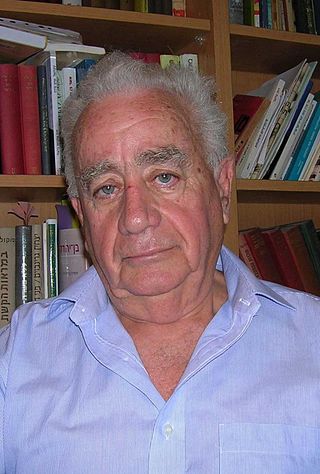
Yosef Gorny, is Professor of Study of Zionism and head of the Zionist Research Institute at the Tel Aviv University. He is a former head of the Weizmann Institute for the Study of Zionism, at the same university.

Zionist Commission for Palestine was a commission chaired by Chaim Weizmann, president of the British Zionist Federation following British promulgation of the pro-Zionist, Balfour Declaration. The Commission was formed in March 1918 and went to Palestine to study conditions and submit recommendations to the British authorities.
Indirect presidential elections were held in Israel on 16 February 1949 to elect the first president of the State of Israel. The president was elected by the 120 members of the Knesset and would replace the president of the Provisional State Council as head of state.

"A land without a people for a people without a land" is a widely cited phrase associated with the movement to establish a Jewish homeland in Palestine during the 19th and 20th centuries. Its historicity and significance are a matter of contention.
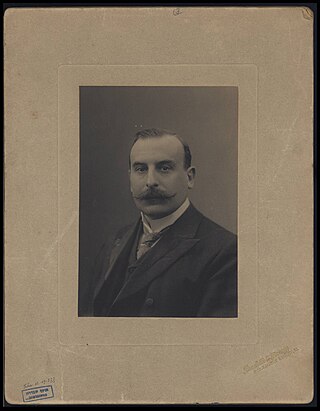
L. J. Greenberg, born Leopold Jacob Greenberg (1861–1931), was a British journalist. He had become an energetic propagandist of the new Zionism in England by the Third Zionist Congress in 1899, at which he and Jacob de Haas were elected as members of the ZO's Propaganda Committee. His frequent dialectical debates were conducted as editor of The Jewish Chronicle, the leading paper in Britain for the Jewish community. Greenberg called for decency and humanity towards World Jewry.
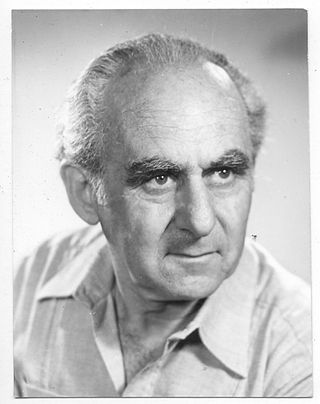
Otte Wallish (1906–1977) was a Czech emigre to Israel who established himself as a graphic designer and contributed to the symbolic self-representation of the Jewish state.

Shneor Zalman Abramov was an Israeli politician who served as a member of the Knesset between 1959 and 1977. As a writer he usually signed by using the acronym S.Z. Abramov.
Harry Sacher was a British businessman, journalist, and Zionist leader. He was appointed director of Marks & Spencer in 1932.

Yossi Goldstein is an Israeli historian and biographer. Goldstein's research focuses on Modern Jewish History, the History of Zionism, and the History of the State of Israel. Goldstein is a professor at the Faculty of the Social Sciences and the Humanities at the Ariel University Center. He has published biographies of Eli Horovitz, Levi Eshkol, Yitzhak Rabin and Golda Meir.

Meyer Wolf Weisgal was an American journalist, publisher, playwright, fundraiser, and Zionist activist who served as the President of the Weizmann Institute of Science and as the founding President of Beit Hatfutsot.
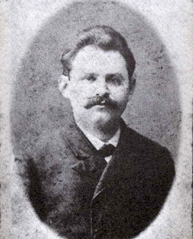
Isaac Leib Goldberg was a Zionist leader and philanthropist in both Ottoman Palestine and the Russian Empire, and one of the principal founders of Rishon LeZion, the first Zionist settlement founded in the Land of Israel by the New Yishuv. An early member of the Hovevei Zion movement (1882), he also founded the Ohavei Zion society. Goldberg was a delegate to the First Zionist Congress and the founder of two Hebrew newspapers, Ha'aretz and Ha'am.
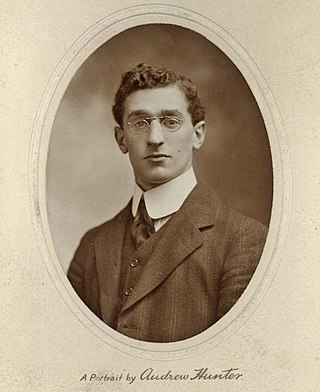
Sir Leon Simon was a leading British Zionist intellectual and civil servant who took part in the drafting of the Balfour Declaration of 1917 and served on the Zionist Commission with Chaim Weizmann. An advocate of cultural Zionism and the revival of Hebrew language, Simon was a scholar and translator of Ahad Ha'am, and produced the first modern Hebrew translations of Plato. He served as the Chairman of the Hebrew University of Jerusalem’s Executive Council, and from 1949–50 as the university's President.

Moshe Yegar is an Israeli retired diplomat and historian of Islam in Southeast Asia; also, he is author of books and research articles on the history of Zionism during the British Mandate, and about Israel's Ministry of Foreign Affairs and its policies and activities.

Aaron (Aharon) S. Klieman was an American-born Israeli historian of international relations who developed the field of international affairs in Israel and abroad. Klieman researched a wide variety of fields in political science including history, arms sales, and geopolitics. He was the Dr. Nahum Goldmann Chair in Diplomacy and lecturer on international relations in the Department of Political Science at Tel-Aviv University, and was the founding director of the Abba Eban Graduate Program in Diplomatic Studies. A native of Chicago, Illinois, his PhD is from The Johns Hopkins University School of Advanced International Studies, with an M.A. from the School of International Affairs at Columbia University in Middle Eastern studies.
References
- 1 2 Golani, Motti (9 April 2004). "Midwife to our current conflict". Haaretz. Retrieved 2020-12-29.